In recent months, President Trump’s tariff threats have sent shockwaves through the business community, prompting U.S. companies to scramble for lobbyists and loopholes to navigate the uncertain economic landscape. The implications of these trade tensions are profound, with companies facing increased costs, disrupted supply chains, and heightened uncertainty about the future of international trade relations.
One of the primary responses from U.S. companies has been to ramp up their lobbying efforts in Washington, D.C. in an attempt to sway policymakers and influence trade policies that align with their business interests. Lobbying expenditures have surged as businesses seek to protect their bottom line and maintain competitive advantages in the face of escalating tariffs. While lobbying can be an effective strategy for certain companies, it also raises questions about fairness and transparency in the policymaking process.
Furthermore, companies are scouring the tax code for potential loopholes and exemptions that could help mitigate the impact of tariffs on their operations. By strategically structuring their businesses and supply chains, companies can potentially reduce their exposure to tariffs and maintain profitability in the face of changing trade dynamics. While exploiting loopholes may offer short-term relief, it also underscores the need for comprehensive and fair trade policies that promote a level playing field for all businesses.
The escalation of trade tensions has also prompted U.S. companies to diversify their supply chains and explore alternative sourcing options to reduce reliance on products subject to tariffs. This shift has significant implications for global trade dynamics, as companies seek to adapt to a more fragmented and unpredictable trade environment. While diversification can enhance resilience and flexibility, it also adds complexity and costs to supply chain management.
Moreover, companies are exploring innovative strategies such as product redesign, price adjustments, and market diversification to offset the impact of tariffs on their businesses. These proactive measures demonstrate the adaptability and resilience of U.S. companies in the face of external challenges. By embracing innovation and strategic planning, companies can position themselves for long-term success in an increasingly volatile global market.
In conclusion, President Trump’s tariff threats have thrust U.S. companies into a period of unprecedented uncertainty and upheaval. As businesses navigate this challenging landscape, they are leveraging lobbying, loopholes, diversification, and innovation to mitigate the impact of tariffs and maintain competitiveness. However, the long-term implications of these strategies remain uncertain, underscoring the need for comprehensive and equitable trade policies that foster a stable and predictable global trading environment. Only through proactive engagement and strategic planning can U.S. companies weather the storm of trade tensions and emerge stronger and more resilient in the face of adversity.
